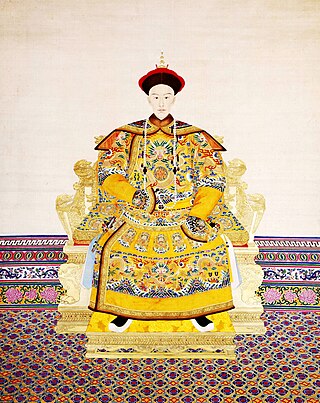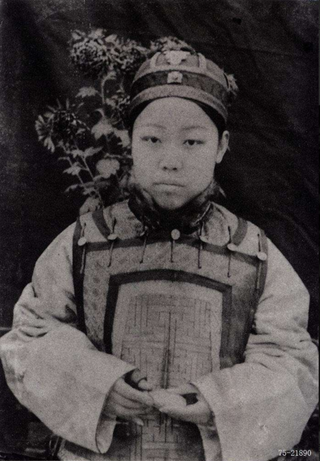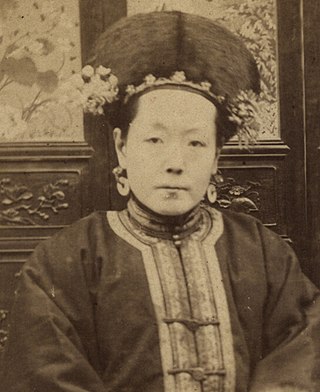
Empress Dowager Cixi ; born Yehe Nara Xingzhen, was a Chinese noblewoman of the Manchu Yehe Nara clan who effectively controlled the Chinese government in the late Qing dynasty as empress dowager and regent for almost 50 years, from 1861 until her death in 1908. Selected as a concubine of the Xianfeng Emperor in her adolescence, she gave birth to a son, Zaichun, in 1856. After the Xianfeng Emperor's death in 1861, his five-year-old son became the Tongzhi Emperor, and Cixi assumed the role of co-empress dowager alongside Xianfeng's widow, Empress Dowager Ci'an. Cixi ousted a group of regents appointed by the late emperor and assumed the regency along with Ci'an. Cixi then consolidated control over the dynasty when she installed her nephew as the Guangxu Emperor at the death of the Tongzhi Emperor in 1875. Ci'an continued as co-regent until her death in 1881.

The Guangxu Emperor, also known by his temple name Emperor Dezong of Qing, personal name Zaitian, was the tenth emperor of the Qing dynasty, and the ninth Qing emperor to rule over China proper. His reign, which lasted from 1875 to 1908, was largely dominated by his aunt Empress Dowager Cixi. Guangxu initiated the radical Hundred Days' Reform but was abruptly stopped when the empress dowager launched a coup in 1898, after which he was held under virtual house arrest until his death.

The Tongzhi Emperor, also known by his temple name Emperor Muzong of Qing, personal name Zaichun, was the ninth Emperor of the Qing dynasty, and the eighth Qing emperor to rule over China proper. His reign, from 1861 to 1875, which effectively lasted through his adolescence, was largely overshadowed by the rule of his mother, Empress Dowager Cixi. Although he had little influence over state affairs, the events of his reign gave rise to what historians call the "Tongzhi Restoration", an unsuccessful modernization program.

The Xianfeng Emperor, also known by his temple name Emperor Wenzong of Qing, personal name Yizhu, was the eighth emperor of the Qing dynasty, and the seventh Qing emperor to rule over China proper, reigned from 1850 to 1861. During his reign, the Qing dynasty experienced several wars and rebellions including the Taiping Rebellion, Nian Rebellion, and Second Opium War. He was the last Chinese emperor to exercise sole power.

Yixin, better known in English as Prince Kung or Gong, was an imperial prince of the Aisin Gioro clan and an important statesman of the Manchu-led Qing dynasty in China. He was a regent of the empire from 1861 to 1865 and wielded great influence at other times as well.

Yixuan, formally known as Prince Chun, was an imperial prince of the House of Aisin-Gioro and a statesman of the Manchu-led Qing dynasty in China. He was the father of the Guangxu Emperor, and the paternal grandfather of Puyi through his fifth son Zaifeng.

Zaifeng, also known as Tsai Feng, Prince of Ch'ün, formally known by his title Prince Chun, was a Manchu prince and regent of the late Qing dynasty. He was a son of Yixuan, the seventh son of the Daoguang Emperor, and the father of Puyi, the Last Emperor. He served as prince regent from 1908 to 1911 during the reign of his son until the Qing dynasty was overthrown by the Xinhai Revolution in 1911.

Youlan, of the Manchu Plain White Banner Gūwalgiya clan, was a consort of Zaifeng and the mother of China's last emperor Puyi.

Cuiyan (1866–1925), of the Manchu Bordered White Banner Liugiya clan, was a consort of Yixuan. She was 26 years his junior.

Yehe Nara Jingfen, of the Manchu Bordered Yellow Banner Yehe Nara clan, was the wife and empress consort of Zaitian, the Guangxu Emperor. She was empress consort of Qing from 1889 until her husband's death in 1908, after which she was honoured as Empress Dowager Longyu. She was posthumously honoured with the title Empress Xiaodingjing.

Imperial Noble Consort Wenjing, also known as Dowager Imperial Noble Consort Duankang, of the Manchu Bordered Red Banner Tatara clan, was a consort of the Guangxu Emperor.
Yicong (23 July 1831 – 18 February 1889), formally known as Prince Dun, was a Manchu prince of the Qing dynasty.

Ronglu, courtesy name Zhonghua, was a Manchu political and military leader of the late Qing dynasty. He was born in the Guwalgiya clan, which was under the Plain White Banner of the Manchu Eight Banners. Deeply favoured by Empress Dowager Cixi, he served in a number of important civil and military positions in the Qing government, including the Zongli Yamen, Grand Council, Grand Secretary, Viceroy of Zhili, Beiyang Trade Minister, Secretary of Defence, Nine Gates Infantry Commander, and Wuwei Corps Commander. He was also the maternal grandfather of Puyi, the last Emperor of China and the Qing dynasty.

Zaizhen, courtesy name Yuzhou, was a Manchu prince and politician of the late Qing dynasty. Romanised forms of his name include Tsai-chen, Tsai-Chen, Tsai-Cheng.

Zaiyi, better known by his title Prince Duan, was a Manchu prince and statesman of the late Qing dynasty. He is best known as one of the leaders of the Boxer Rebellion of 1899–1901.
The Imperial Decree on events leading to the signing of Boxer Protocol is an imperial decree issued by the government of the Qing dynasty in the name of the Guangxu Emperor, as an official imperial statement on historical events such as Boxer Rebellion, Eight-Nation Alliance and Battle of Peking and Siege of the International Legations, detailing instructions given to Prince Qing and Li Hongzhang as the full representatives of the imperial court in negotiating a peace treaty with the foreign powers, prior to the official signing of the Boxer Protocol on 7 September 1901. This Imperial Decree was officially issued in the name of the Guangxu Emperor and with his official Imperial Seal. The Emperor was actually under house arrest at the time, ordered by Empress Dowager Cixi who held full administrative power.

Wanzhen, of the Manchu Bordered Yellow Banner Yehe Nara clan, was a consort of Yixuan. She was one year his junior and the younger sister of Empress Cixi and the mother of Emperor Guangxu.
Yunlu, born Yinlu, was a Manchu prince of the Qing dynasty. He was born in the Aisin Gioro clan as the 16th son of the Kangxi Emperor. His mother was Consort Mi (密妃), a Han Chinese with the family name Wang. He was good in mathematics and musical tuning. When Boguoduo (博果鐸), the 2nd Prince Zhuang of the First Rank, died in 1723 without an heir. Yunlu was adopted as his heir and inherited his peerage. Yunlu was trusted by Yongzheng Emperor. In 1723, the emperor became seriously ill, Yunlu was appointed as one of regents together with Yunli, Ortai and Zhang Tingyu to assist the new emperor. However, when Hongxi (弘晳), the 2nd Prince Li of the First Rank, was found guilty of rebellion in 1739. Yunlu was implicated in the case and stripped of official position. He returned to politics and managed the Department of Sacrificial Rite Music in 1742, but was no longer trusted by Qianlong Emperor. He died in 1767, and was granted the posthumous name "Ke". His princely title was inherited by his eldest grandson, Yongchang (永瑺).
Puyi, the last emperor of China, came from a long noble ancestry. During the course of his three terms as emperor, and during post war life, he had five wives and numerous consorts.
Aisin Gioro Yizhi was a Qing dynasty imperial prince and the first son of Mianxin, Jiaqing Emperor's fourth son. Yizhi did not have a male heir to inherit his title, so the peerage was de facto extinct. There were two posthumous adoptions done so as to continue the lineage. The peerage was finally abolished in 1900 due to the brutal involvement of Zaiyi in the Boxer Rebellion.
















